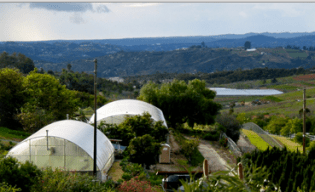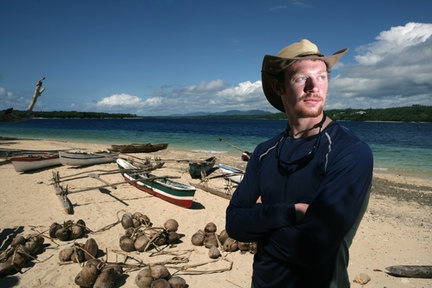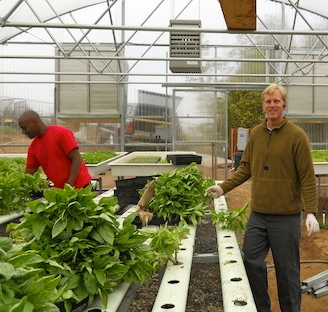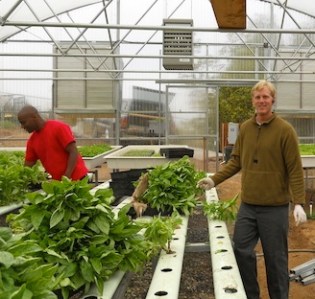Tucked into San Diego’s rolling hills, Archi’s Acres is a stark departure from the war Marine Sgt. Colin Archipley left behind. Rather than hunt down insurgents, he now grows oversized basil and specialty crops on six acres for local markets. The work is hard, but for Sgt. Archipley, it feels like a respite from the six years he spent training and fighting in Iraq.
In need of a second act, Archipley and his wife Karen pooled their resources to open the farm in 2007. Their mission is twofold; they hope to operate a successful small-scale organic farm and help soldiers make the transition from fighters to champions of sustainable agriculture and financial independence. Together the couple runs a program called Veterans Sustainable Agriculture Training (VSAT), a six-week course run in partnership with two local community colleges that focuses on organics and hydroponics (and the combination of the two, which is rare), as well as greenhouse production and the basics of putting together a business plan.
The couple belongs to a budding veterans-to-farmers movement, a larger effort to recruit vets released from military service to help reinvigorate the aging population of farmers, 40 percent of whom are expected to retire within the next decade. I spoke with Archipley recently about the program and the larger scope of the movement.
Q. In your TEDx presentation you mentioned that food security is tied to national security. Would you mind elaborating on that?
A. When people aren’t hungry they naturally feel better. But more importantly any strong economy is based on a foundation of agriculture. And that’s definitely true in the United States. The original colonies were founded on tobacco, corn, and cotton. Those ties go all the way back to the start of our country. Globally, areas that have food have access to agricultural systems and those agricultural systems build a foundation for local economies. You have money flowing, people are able to pay their bills, feed their family, [pay for an] education, and so forth. If you look at a global map, areas that have food shortages are more hostile.
Q. That’s quite a transition from Marine sergeant to farming. Did you have any understanding of what you were getting yourself into?
A. We had no idea. And that might have been a good thing because we had no understanding of how difficult it could be. We purchased the farm because we really liked the property and the area, not with the idea of becoming full-time farmers. When I came back from Iraq, I still had a few-month commitment with the Marine Corps. [Then] I starting working with the avocados and I really enjoyed that. One thing I enjoy about agriculture is the physical lifestyle it provides. I couldn’t see myself in a cubicle. [We like] the fact that we’re self-employed. I don’t have a manager staring over my shoulder. Our boss is our customer. We started the training program to share that message with other like-minded people who might enjoy similar types of freedoms.
Q. How many people have passed through your Veteran Sustainable Agriculture Training program?
A. Last year, I think we trained about 45 people and we have 15 people we’re working with right now. We work with a lot of active duty soldiers, which means they need to get permission from their commanders to come and train here. Last year was [about] proving that agriculture is a viable career and that we have a viable business. There’s got to be more options available for military people entering the private sector in these crazy times.
Q. Do you think the program simply allows soldiers to decompress or does it actually lead to careers in farming?
A. We see ourselves as an agribusiness incubator. Our goal is to lead men and women from the military into careers in agriculture, or into entrepreneurship in the food and fiber industries. It can give them a greater sense of a mission; like the military, the food system is a part of something greater. You can hang your hat up at the end of the day and say I really did something today to make my community a better place.
Q.  How much food do you produce?
How much food do you produce?
A. [On six acres] we grow 10,000-plus pounds of avocados, 1,200 basil plants per week, and several cases of kale per week. I don’t know offhand. But we are very productive — to the point that we are sustainable.
Q. After the Civil War, Union soldiers received favorable terms under The Homestead Act to settle the West. Do you see historical ties between military service and farming?
A. Absolutely. When the vets came home from World War II, the VA [U.S. Dept. of Veteran Affairs] had an ag training program. And like the vets that reclaimed the West, the vets that are entering farming now will have to discover the future of agriculture. I think the industrial farming model is at a tipping point, it’s no longer sustainable.
Around the turn of the century, about 30 percent of Americans worked in ag. Now it’s less than 3 percent and over half of them are at retirement age or above. So they’re ready to leave the industry. Any time you have a void in the marketplace someone is going to fill it. This is our opportunity.
Q. We have the GI Bill, which enables you to go to school and receive job training. Is there something like that for farming?
A. Well, we’re GI Bill approved; soldiers can come to us through the VA. As far as lending and purchasing programs for farms, there’s CalVet home and farm loans. But we’re excited to see what comes out of the Farm Bill — if the provisions will have lending programs that will be a little more accessible to vets.
Q. Aren’t the start-up costs still tremendous?
A. More and more investors are looking at ag as a better place to put their money. What has done well since the crash of the markets? Agriculture has. Why? Because you have 7 billion people [in the world] and 310 million Americans who need to eat. There are wants, needs, and musts in the economy. You’d like an iPad, but you must eat. Food is becoming more valuable. Jim Rogers, a very successful investor, was quoted in Time Magazine saying: “If you want to make as much money as a banker become a farmer.”
Q. Do you have any alumni success stories?
A. Yes. Mike Hanes. He was a nine-year Marine with several deployments. After separating from the Marine Corps I think he spent two years on the streets, living under a tree. We befriended him and put him through the training program. He has the best hot sauce recipe in the world. Since then he’s launched Dang!!! (a hot sauce made with maca). Now you can find his product at Whole Foods stores throughout California; hopefully nationwide pretty soon.




